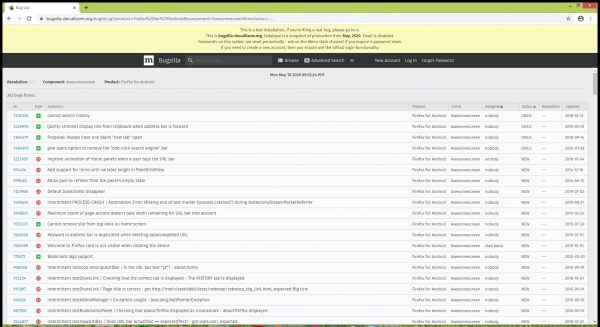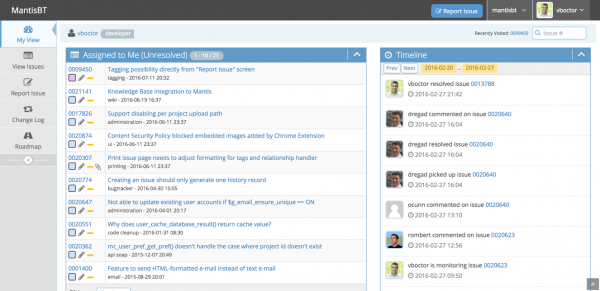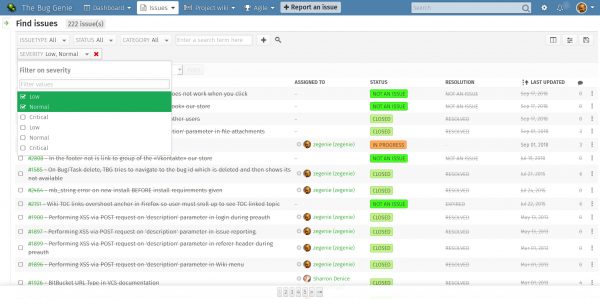Bugs, issue, defect, there are many names to define the problems you have with software, either during the code development phase or when the application is already in production. Bug tracking tools are an integrated part of a software quality and software testing strategy and there are many open source tools available.
Depending on your needs, you don’t need however to spend a lot of money to use a bug tracking system as there are many open source bug trackers that have many features, a good reputation and a long history. This article lists the main open source bug tracking tools available today. Use our contact form to make us aware of some open source defect tracking software that we should add to this list.
Here are some features that you could find in open source bug tracking tool:
- Is it a web-based or a local bug tracking tool that you can install on a local computer
- Can you define and manage your own bug workflow
- Can you add to the bug data some custom fields for bug triage
- Is there a system to notify people concerned by a bug about its life-cycle
- What reports and statistics are available
- Can you take screenshots of the application when you report a bug
- What are the file attachment and sharing capabilities
* Updates
February 2 2024:
Added: git-bug, lavagna
Renamed: The Bug Genie renamed Pachno
BugTracker.NET
BugTracker.NET is a free, open-source, web-based bug or customer support issue tracker written using ASP.NET, C#, and Microsoft SQL Server (or its free cousin, SQL Server Express). You can configure it to be more suitable for the enterprise too, with custom workflows and permissions for a larger organization. Sending and receiving emails is integrated with the tracker, so that the email thread about a bug is tracked WITH the bug. You can set up an email address and BugTracker.NET will turn those incoming emails into items in the database.
Website: https://sourceforge.net/projects/btnet/
Bugzilla
Bugzilla is a web-based open source Defect or Bug Tracking System that is based on the Perl programming language. Bugzilla supports MySQL, PostgreSQL, Oracle and SQLite. Defect Tracking Systems allow individual or groups of developers to keep track of outstanding bugs in their product effectively. Bugzilla is used by all projects from the Mozilla foundation. Despite being free, Bugzilla has many features, like the automatic detection of duplicate bugs.
Consequently, Bugzilla has quickly become a favorite of thousands of organizations across the globe. Bugzilla helps track bugs and code changes; communicate with teammates; submit and review patches; manage quality assurance (QA). Bugzilla can help you get a handle on the software development process. Successful projects often are the result of successful organization and communication. Bugzilla is a powerful tool that will help your team get organized and communicate effectively.
Website: https://www.bugzilla.org/
Eventum
Eventum is a user-friendly and very flexible open source issue tracking system based on PHP and MySQL. It can be used by a support department to track incoming technical support requests, or by a software development team to quickly organize tasks and bugs.
Website: https://github.com/eventum/eventum
Flyspray
Flyspray is a lightweight open source web-based bug tracking system written in PHP for assisting with software development and project managements. It supports currently MySQL and PostgreSQL databases.
Website: http://flyspray.org/
Git-bug
Git-bug is an open source bug tracker that is fully embedded in git: you only need your git repository to have a bug tracker. It is distributed: use your normal git remote to collaborate, push and pull your bugs. Git-bug works offline: in a plane or under the sea? Keep reading and writing bugs. It can integrate with your tooling: use the UI you like (CLI, terminal, web) or integrate with your existing tools through the CLI or the GraphQL API. It provides bridges to other bug trackers: use bridges to import and export to other trackers.
Website: https://github.com/MichaelMure/git-bug
Lavagna
Lavagna is a small and easy to use open source issue/project tracking software. It requires Java 8 or better and optionally a database: MySQL, MariaDB or PostgreSQL. Lavagna can be deployed in a Java servlet container or as a self contained war. You can use customized labels and checklists to define the scope. It is possible to share information with comments and files.
Website: https://github.com/digitalfondue/lavagna, https://lavagna.io/
MantisBT
MantisBT (Mantis Bug Tracker) is an open source web-based bug tracking tool that has been available for more than 15 years and that offers an interface in 50 languages. The software provides ways to customize the user roles and the bug process workflow. MantisBT has a plugin system that allows extension of MantisBT through both officially maintained and third party plugins.
Website: https://www.mantisbt.org/
Pachno
Pachno (previously the Bug Genie) is an open source issue tracking system, built on open source technology. It enhances your development process, by offering an advanced tool to manage bug reports, feature requests and user feedback for your products. With all the features, this tool mixes defect and project management capabilities. On the bug tracking side, The Bug Genie allows defining multiple workflows with custom transition views.
You can also add any number of custom fields to your issue types and issues – custom text input fields, multiple choice drop-downs, custom status fields, and more. A paid hosted version is available.
Website: https://www.pach.no/
Roundup
Roundup is a simple-to-use and -install issue-tracking system with command-line, web and e-mail interfaces. The current stable version has quite a comprehensive feature set. Roundup has been deployed for bug tracking and TODO list management.
Website: http://roundup.sourceforge.net/
Trac
Trac is an enhanced wiki and issue tracking system for software development projects. Trac uses a minimalist approach to web-based software project management. Our mission is to help developers write great software while staying out of the way. Trac should impose as little as possible on a team’s established development process and policies. It provides an interface to Subversion, an integrated Wiki and convenient reporting facilities. Trac allows wiki markup in issue descriptions and commit messages, creating links and seamless references between bugs, tasks, change sets, files and wiki pages. A timeline shows all project events in order, making the acquisition of an overview of the project and tracking progress very easy.
Website: https://trac.edgewall.org/
WebIssues
WebIssues is an open source, multi-platform system for issue tracking and team collaboration. It can be used to store, share and track issues with various attributes, comments and file attachments. It is easy to install and use but has many capabilities and is highly customizable. WebIssues offers much greater possibilities of customization than most traditional issue tracking systems. It allows tracking bugs, tickets, tasks, requests and any other information, with the same flexibility as a spreadsheet, where columns can be freely added and modified.
However, WebIssues allows many people to work simultaneously, maintains the full history of changes, controls the permissions for different areas of the system, and makes it possible to discuss and exchange information about individual issues and to attach files to them. WebIssues provides access by both the web browser and a desktop client application, which natively supports Windows, Linux and OS X. The desktop client makes everyday work with the system easier and faster, by providing comfortable user interface, instant search and convenient editing. The web client makes it possible to access the system from any location at any time.
Website: https://webissues.mimec.org/






That’s a good list of bug tracking tools but, you’ve missed some of them that are leading in the market. Of course, it is not possible to include the features of all the tools in one post.
I like to share a piece of information that is if we get bug tracking at the beginning of the software development process, then production defects will get reduce.
Regards,
RobertoR, Testree
Thanks for your comment. Please note that this list contains only open source tools. If you know any of them that should be mentioned here, let us know.